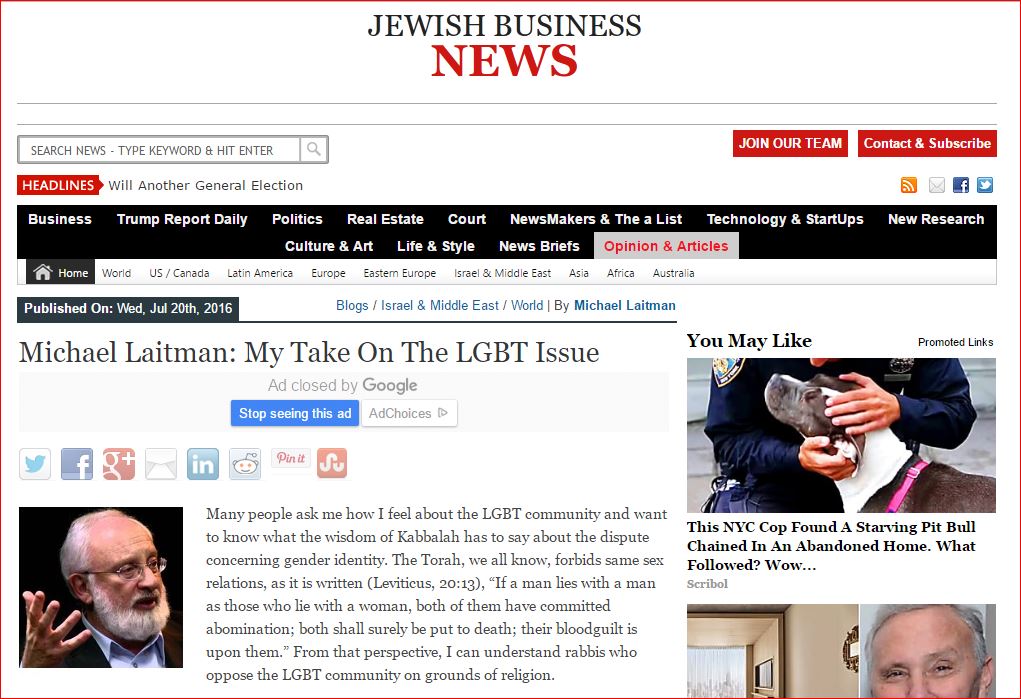
Many people ask me how I feel about the LGBT community and want to know what the wisdom of Kabbalah has to say about the dispute concerning gender identity. The Torah, we all know, forbids same sex relations, as it is written (Leviticus, 20:13), “If a man lies with a man as those who lie with a woman, both of them have committed abomination; both shall surely be put to death; their bloodguilt is upon them.” From that perspective, I can understand rabbis who oppose the LGBT community on grounds of religion.
However, and there is a big however here, the wisdom of Kabbalah relates to a deeper level of reality. According to the wisdom of Kabbalah, the relationships that the Torah discusses do not reflect physical relations, but rather ties of love and bonding among the parts of the common, collective soul. These parts of the soul are the most connected precisely when they are built atop fragmentation and hatred, as King Solomon put it (Proverbs 10:12): “Hatred stirs up strife, and love covers all crimes.”
Among the millions of Bnei Baruch students in Israel and the world over, there are also those who belong to the LGBT community. In light of recent statements in the Israeli media, some Israeli students have approached me about these issues. My answer is clear and simple: studying with Bnei Baruch is open to every single person! In our study groups there are people of every gender, sexual inclination, faith, religion, nationality and color. We do not discriminate or exclude anyone! Our message stresses finding what connects us, and building a strong fabric of connection above our differences. This is the only way we will be able to feel like parts of one society, one nation, and one country.
In the spiritual sense, we, the Israeli people, are still in exile. Even though we have official sovereignty in Israel, we are internally separated. We are suffering from unfounded hatred, and this exile from unity is precisely the ailment that has caused our exile from the physical land of Israel some two millennia ago. Therefore, we should not conduct ourselves according to what the Torah dictates concerning a corrected nation, but according to our true, shattered state of exile, until we achieve true connection and mutual love as the Torah requires.
It is important to remember that our primary work is to correct the broken ties between us, not to correct one another!
How To Go About Correcting Our Relations
We begin with mutual consideration. Just like family members respect one another, we can do it as long as the disputed factions of our society restrain themselves despite the bursting egos, and search for ways to turn enemies into friends.
As this is true for statements given by rabbis, it is also true with respect to the LGBT community “flaunting” their sexual inclinations at parades and festivals. This mutual taunting does nothing but stir up anger and hatred, and we must keep in mind that all sides in this story have feelings. In short, people should be left in peace to lead their own personal sex life in private.
Our goal is not to severe our routes for connection, but to build a unified peoplehood. Mutual accusations will not help us establish a sound society. Our greatness is measured not by the extent to which we abuse one another, but by the extent to which we fuse with each other.
Since we do not, and should not come from the same assembly line where we all share the same views, let us stop being aggressive and disrespectful toward each other. Instead, let us treat others the way we would like them to treat us.
The wisdom of Kabbalah values a person only according to one’s effort to connect with others “as one man with one heart.” When we act this way toward each other, with mutual guarantee, we will set an example of a role model society to the whole of humanity. Let us take pride in this!
Featured in Jewish Business News